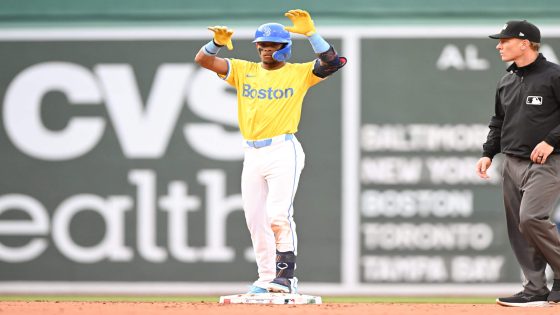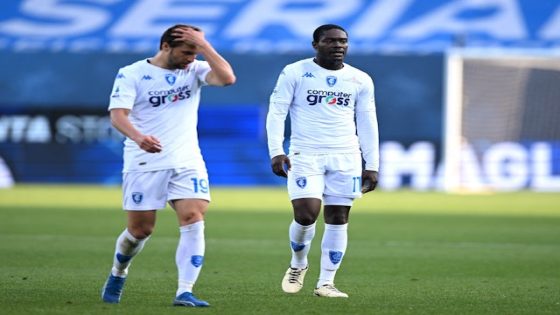
BOSTON — Ceddanne Rafaela has had a few multiple-hit games over the course of the first month of the season, but none like Saturday.
The rookie entered the day after two straight hitless games with a .156 average. But after a single and sacrifice fly in his first two plate appearances, he came to bat in the fifth with the bases loaded and smoked a bases-clearing double to left field. In the seventh, he cranked a two-run homer to center. Rafaela began Saturday with 10 RBIs and ended it with seven more, finishing a triple shy of the cycle.
Even more importantly, on Sunday he went 1-for-4, lining a double to right field in the sixth inning and scoring a run in a 5-4 walk-off win for the Boston Red Sox over the Chicago Cubs, moving the Red Sox to 16-13 on the season. In each of Rafaela’s previous multi-hit performances like Saturday’s four-hit night, he’d followed up with a hitless game the next day. Not Sunday.
Baby steps.
Make it a 6-RBI day for Rafaela! pic.twitter.com/Kza31MRi1K
— Red Sox (@RedSox) April 27, 2024
Rafaela’s defense has been invaluable, especially since moving to shortstop on a full-time basis during the last road trip. His sure-handedness on a team in need of defensive stability has made him a lock on this roster, but his inconsistency at the plate has been frustrating.
And yet manager Alex Cora has been patient with Rafaela and his other inxperienced players, riding the ebbs and flows of what it is to have so many rookies on a big-league club.
On an active roster where 19 of 26 players have three or fewer years of service time, including rookies Wilyer Abreu and Justin Slaten, Cora has learned a lot about managing young players.
“This is the big leagues and it takes a while,” Cora said. “There’s a learning curve and we have to be patient. We’ve been patient throughout since I got here with certain guys and now they’re established big leaguers.”
It wasn’t hard to realize he was referring to two players in particular for whom his trust has paid off: Triston Casas and Jarren Duran.
While neither are grizzled veterans, they’ve both become key pieces of the club’s young core. Casas is currently sidelined with a rib cartilage injury but Duran, once again, played a key role in Sunday’s win, drawing a leadoff walk in the ninth and later scoring the winning run on a Tyler O’Neill bloop single.
It wasn’t long ago, though, that Duran was struggling mightily. In 2022, he endured a rough year both offensively — hitting .221 with a .645 OPS — and even more so defensively.
Casas faced a similar early career crossroads. Through the first two months of 2023, he hit .188 with a nearly 30 percent strikeout rate. But from July 14 to Sept. 14 when his season ended with shoulder inflammation, he hit .317 with a 1.034 OPS. He finished the year third in American League Rookie of the Year voting.
Cora’s confidence in each of them unlocked another level of play for both. His dedication to playing rookies, letting them make adjustments and live through failure, helped them grow in ways that might not have been possible if they’d returned to the minors. Of course he can only play the roster he’s been provided with, but guiding them through the ups and downs has been a big part of his job of late.
On a weekend in which the Baltimore Orioles sent baseball’s top-ranked prospect Jackson Holliday back to Triple A after a 2-for-34 start, that trust stood out even more.
“I remember I used to think, if I messed up, I’m not going to play, I don’t deserve to play,” Duran said. “But then you get put back in the lineup, and it’s like, ‘OK, maybe I’m allowed to make mistakes. Maybe I’m allowed to be a little easier on myself.’ It’s part of the game, and honestly a big thing for me was realizing that it happens to everybody. Mike Trout strikes out. (Shohei) Ohtani strikes out. Mookie (Betts) gets out.”
Casas added similar perspective.
“Seeing (big-name players) fail at this level, as weird as it sounds, made me feel settled,” he said. “To know that I’m making the same mistakes, like I’m striking out, I’m swinging at bad pitches and I’m bobbling balls in the field, just like they are… It made me feel a little more comfortable to just go out there and try to put my best foot forward and not be so afraid to fail.”
In a sport where failure is a common denominator, it doesn’t mean it’s easy to accept, particularly for players who excelled as amateurs.
Add to it the intensity of a market like Boston where top prospects are tracked so intently and the pressure mounts. It’s part of the reason why, despite the hype around top Red Sox prospects like Marcelo Mayer, Roman Anthony and Kyle Teel, the Red Sox are trying to slow things down. They can’t erase the excitement, but setting the players up for a better chance at success — or perhaps more accurately, helping them figure out ways to accept failure — will help in the long run.
Cora recalled a play on Thursday in which Rafaela was at the plate in the sixth with men on second and third and in a two-strike count. He made sure he made contact, grounding out to second, but scoring a run.
“We made sure that we celebrated that out because that’s what winning baseball is,” Cora said. “Do we want him to hit homers and run around? Of course. But you have to take it step by step.
“That’s the biggest challenge for the kids,” Cora said. “People expect these guys to come up here and win 20 games and hit .330 and hit 30 home runs. That doesn’t happen. It might happen, but most of the time it doesn’t happen. We just have to make sure we make them feel comfortable and be patient with them, and hopefully the Durans happen and Casas and (Dustin) Pedroia and (Jacoby) Ellsbury, all those guys. But you’ve got to be patient. We’ve been through this a lot as an organization, and I think we have a pretty good idea how to do it.”
If it means that Cora will take flak for the rookie growing pains, he sees it as part of the job.
Rafaela, too, has the added pressure of having just signed an eight-year, $50 million contract extension. It’s been a lot in a short amount of time.
“This guy is going to be here,” Cora said of Rafaela. “How are we going to help him to be better this week? Let’s not talk about next month or the whole season. Let’s take it series by series, at-bat by at-bat and hopefully we can get there.”
There’s also a fine line of pushing a player too hard while being mindful of giving the big-league team its best chance to win. When shortstop Trevor Story went down eight games into the season, the Red Sox turned to David Hamilton at shortstop. A capable defender, Hamilton struggled mightily in the field and the issues compounded. Cora kept giving him a chance before shifting Rafaela from center to short. It might not seem like Hamilton can climb out of his current nadir but he only has to look as far as Duran or Casas for inspiration.
“We’re playing a game that we want to be perfect in and you can’t be perfect in,” Duran said. “So it’s a constant battle of trying not to beat your head into the wall trying to be perfect. It just comes with maturing and just playing this game and getting to know stuff to be able to be better than you want to be.”
Every player develops on his own path, but Cora has found a blueprint for patience that he’s likely to follow closely this season.
(Photo of Rafaela from Saturday’s game: Brian Fluharty / Getty Images)



